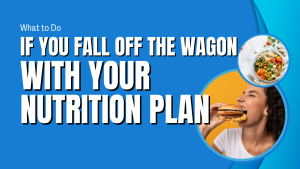What to Do If You Fall Off the Wagon with Your Nutrition Plan
Let’s be honest:
Everyone who’s tried to stick to a nutrition plan has fallen off the wagon at some point. It’s normal. It’s human. And it’s not the end of the world.
So the real question isn’t if you’ll slip up—it’s how you respond when it happens.
The Most Powerful Tool? Self-Compassion.
Now before you roll your eyes, hear this out:
Self-compassion isn’t weakness—it’s a strength. And when it comes to long-term fat loss or body composition goals, it might be the most important mindset skill you can build.
The 3 Elements of Self-Compassion
1. Common Humanity
You are not alone.
Everyone falls off track. And if others have bounced back, so can you.
You're not broken—you’re just human.
2. Healthy Self-Talk
How do you speak to yourself after a slip-up?
Don't beat yourself up. But don't give yourself a pass either.
Talk to yourself the way you would your best friend: honest, kind, and constructive.
3. Mindfulness
Be aware of what’s happening before, during, and after a slip.
Mindfulness helps you spot patterns, triggers, and decision points—before things spiral out of control.
Why Self-Compassion Works
When you apply these tools, here’s what happens:
You slip up (like everyone does).
But instead of spiraling into “I’ve ruined everything,”
you pause, reflect, and reset.
You turn a small deviation into just that—a small deviation.
Not a full-blown derailment.
Over time, you get better at recognizing setbacks quickly,
responding with honesty and kindness, and getting back on track.
The Result? Real, Sustainable Progress.
With self-compassion, you’ll:
-
Stick to your plan longer
-
Bounce back faster after setbacks
-
Navigate social events, birthdays, and dinners without guilt
-
Build real confidence in your ability to stay consistent
Struggle with falling off and bingeing?
Self-compassion is the skill you need most.
Practice it. Refine it. Master it—and your results will follow.

